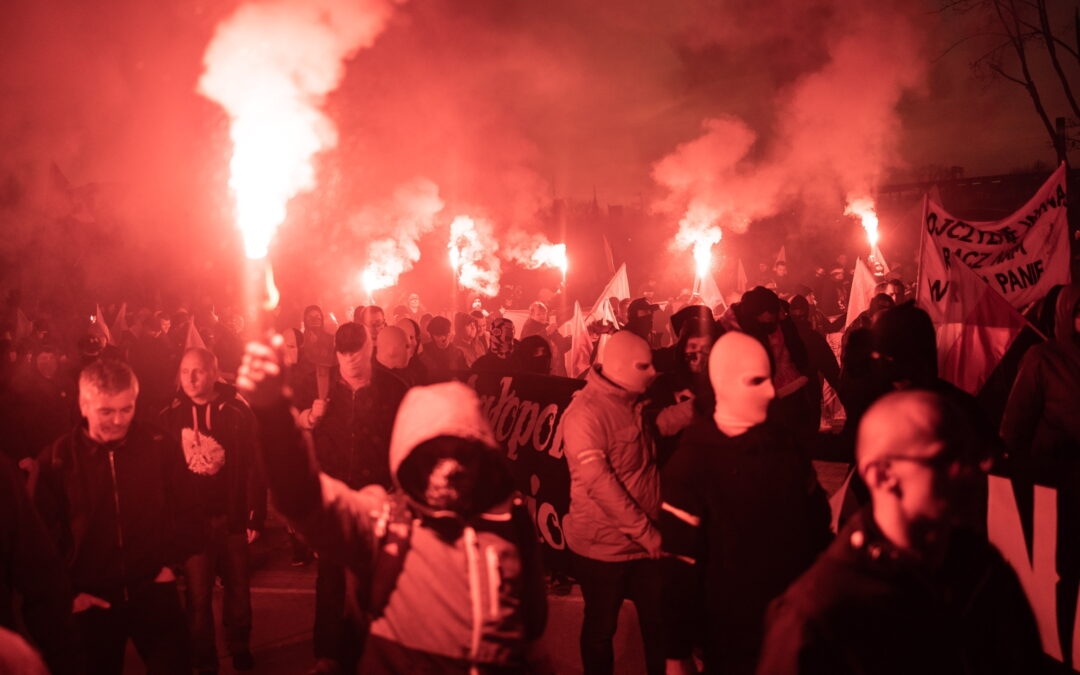Poland’s deputy interior minister has warned that Russia could use “provocations” to cause trouble at tomorrow’s nationalist march in Warsaw to mark Polish Independence Day.
The event, which is organised by three far-right groups, often draws over 100,000 participants, including extremists but also many mainstream conservatives. While some marches, such as last year’s, have passed peacefully, others, for example the one in 2020, have seen outbreaks of violence.
When such disturbances have happened, Poland’s national-conservative government – which is not involved in organising the march but has been sympathetic towards it – has blamed “provocateurs”, though without presenting evidence.
Opposition parties have called for the nationalist Independence March to be banned, following violence at this year's event in Warsaw.
But the ruling PiS party says it is "a great demonstration of patriotism" and blames the clashes on "provocateurs" https://t.co/U7LglHTJ2w
— Notes from Poland 🇵🇱 (@notesfrompoland) November 14, 2020
In an interview with Radio Plus, deputy interior minister Maciej Wąsik was asked about whether the current situation in Ukraine presents extra security challenges for the Independence March this year.
“We are aware that there may be risks, there may be provocations, some situations may be used to discredit” the event, replied Wąsik. “We are aware of what methods Vladimir Putin can use, but we are preparing the [security] services and the entire state for this situation.”
“We will do everything to make this march safe,” continued the minister. “We are in contact with the organisers. I am convinced that the organisers’ intention is to celebrate in a dignified, patriotic and safe manner.”
The head of the march’s organising body, far-right leader Robert Bąkiewecz, also warned participants this week that “we expect some actions to discredit the event”.
“If some people behave in an inappropriate way or have inappropriate emblems, or are confrontational, we will ask such people to leave the gathering,” he added, quoted by Do Rzeczy.
Bąkiewecz has himself, however, been accused of confrontational and inflammatory actions. In 2019, he publicly called for people to fight against the “pure evil” of “LGBT totalitarianism…with fire, literally with fire”.
The following year, participants at his Independence March threw flares at an apartment building where an LGBT rainbow flag was displayed, resulting in one apartment being set on fire.
A fire broke out in an apartment along the route of the Independence March after participants threw flares into it, the fire brigade has confirmed.
There were flags on the building’s balcony showing support for LGBT rights and the abortion protests pic.twitter.com/hYvM8gbRSz
— Notes from Poland 🇵🇱 (@notesfrompoland) November 11, 2020
The opposition mayor of Warsaw, Rafał Trzaskowski, has in the past sought to ban the march, arguing that the groups behind it bear “the hallmarks of fascism”. However, his efforts were last year blocked by the government.
This year’s event, taking place under the slogan “Strong Nation, Great Poland”, will follow the traditional route, starting at Roman Dmowski Roundabout before moving along Aleje Jerozolimskie and across the Poniatowski Bridge, then finishing outside the National Stadium.
A number of other rallies will take place in the capital tomorrow to mark Independence Day, including an anti-fascist march organised annually in opposition to the nationalist event, though which draws far small numbers of attendees.

Daniel Tilles is editor-in-chief of Notes from Poland. He has written on Polish affairs for a wide range of publications, including Foreign Policy, POLITICO Europe, EUobserver and Dziennik Gazeta Prawna.




















